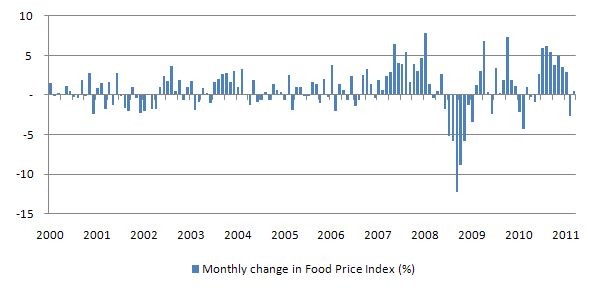Why we should worry about speculation in food markets Future Agricultures blog
Post on: 9 Июнь, 2015 No Comment

By Stephen Spratt. Research Fellow, Institute of Development Studies
Speculators may do no harm as bubbles on a steady stream of enterprise. But the situation is serious when enterprise becomes the bubble on a whirlpool of speculation.” (John Maynard Keynes)
On the day that a consortium of NGOs launches a global campaign to eliminate global hunger. what about the role of financial speculation on food prices? A look at recent history reveals a growing understanding of the impacts of speculation on prices and therefore on the livelihoods and wellbeing of poor people.
2012 saw the worst drought in 50 years in the United States. Other major food producers also experienced an unusually dry year, severely affecting harvests. As prices began to move upwards last summer, many predicted a price ‘spike’ like those seen in 2008 and 2010. In an attempt to avert this, the French President called a meeting of the G20 Agriculture Ministers for mid-October under the banner of the Rapid Response Forum (RRF), established after the last price spike.
Rather than continuing to rise as expected, however, the prices of key food commodities either stayed flat or were falling by September. Some pointed to the role played by the new Agricultural Market Information System (AMIS) in providing accurate information on supply conditions, arguing that this prevented markets becoming spooked. Major producing countries did not impose export bans, and the chunk of the harvest gobbled up by biofuels was also less than in previous years. Collective sighs of relief were heard. The crisis was averted. The emergency RRF meeting was cancelled as ‘it was unnecessary’ – food commodity markets were, we were told, ‘functioning well’.
2012 also saw the US Commodity Futures Trading Commission (CFTC) seek to impose restrictions on financial ‘speculation’ in food markets. The focus was the introduction of ‘position limits’, which limit the proportion of the market that can be held by any one institution. Although the limit still allowed up to a quarter of the market to be so controlled, it was still met with fierce lobbying from the financial sector. This culminated in a Federal District Court judgement in September, which went against the CFTC. The ruling was that the CFTC needed to show that position limits were needed to reduce market instability and volatility, and had failed to do so.
For some, the lack of the expected food price spike means we can relax: measures taken after the last food crisis work – those who had predicted a crisis in 2012 were wrong; critics who suggested that the huge increase in financial speculation in commodity futures markets in the last decade had driven up the level and volatility of prices were also wrong; all that what was needed for markets to work well was better information (i.e. AMIS) and coordination to prevent things like export bans (i.e. the RRF). Controls on financial speculation were unnecessary and likely to be counterproductive: far from increasing volatility and moving prices away from ‘fair values’, speculators stabilises markets by increasing liquidity, and aid ‘price discovery’ by buying undervalued, and selling overvalued, assets.
While some accept this view in its entirety, most are less sanguine. The CFTC is appealing against the court ruling, arguing that position limits are designed to prevent market manipulation, which is crucial for markets to function properly. The European Union plans to implement a similar measure in its review of the Markets in Financial Instruments Directive (MiFID). Outside of the financial lobby, almost everyone agrees that controls on the ability of institutions to exert too large an influence – and potentially manipulate – markets are desirable. Others would go further.
If one thinks, for example, that markets are prone to periodic bouts of ‘irrationality’ – even with good information, and in the absence of abuse – further measures are likely to be required. In September 2012, for example, Members of the European Parliament voted to impose short delays on computerised, high frequency trading in food commodity markets, arguing that this kind of trading is likely to increase volatility. Others, such as the World Development Movement (WDM), have called for the total amount of financial ‘speculation’ in the market to be restricted. The argument is the same as that used by Keynes in the quote at the start of this blog post: too much financial speculation relative to trading based on ‘real’ economic activity is likely to destabilise markets.
The UN’s Special Rapporteur on the Right to Food made a similar argument in 2010 :
A significant contributory cause of the price spike was speculation by institutional investors who did not have any expertise or interest in agricultural commodities, and who invested in commodities index funds because other financial markets had dried up, or in order to hedge speculative bets made on those markets.
In a series of papers, UNCTAD have pointed to the increasing correlation between commodity prices and those of other financial assets. Ten years ago, there was little relationship between movements in European stock markets, the price of crude oil in the US, and a global diversified commodity price index. The picture today is very different:
. the financialization of commodity markets reveals a dramatic change. Despite the similarities in 2002 and 2012 in terms of real shocks – insecurity in West Asia, the aftermath of a stock market crash and a difficult cereals harvest – the evolution of the three indices could not be more different. Ten years ago each market had its own dynamics, but in 2012 they are moving in nearly perfect tandem.

UNCTAD’s point is subtle but important. Rather than being driven by supply and demand conditions in the real economy, food prices are increasingly determined by events in other markets. The common factor is finance.
So who is right, and does it matter? Despite the circumstantial evidence, it has not proved possible to prove a link between increased speculation in food futures markets and spot market prices. People who work in these markets, however, are generally in no doubt that such a link exists. Even if there was a link, however, would this be a problem? Well, this comes back to your view of how financial markets work. Financial speculators could help stabilise market prices around ‘fair values’ that accurately reflect economic fundamentals, or they could increase volatility and drive prices away from these values.
On this question, the evidence presented in the new FAC Working Paper Food price volatility and financial speculation (pdf), suggests that UNCTAD may be right: the risk of heightened volatility and inaccurate price signals resulting from the financialization of food markets is very real, even if markets appear to be working well today. After all, before the crisis of 2008 there was much talk of how sophisticated and efficient global financial markets had become, and how market prices could now instantly adjust to accurately reflect changing ‘economic realities.’
The final question is whether more volatile or inaccurate prices matter much. Here the answer is clear. Food markets are different to other financial markets. Stable prices that send accurate signals are of fundamental importance to the lives of billions, and are a crucial element in protecting against hunger and poverty. Set against this, the ‘costs’ of placing some curbs on speculation, which in the end may be no more than a reduction in the profitability of some financial institutions, are trivial.
Links
- Food price volatility and financial speculation (pdf)
FAC Working Paper 47, by Stephen Spratt
Institute of Development Studies, UK — February 2012














